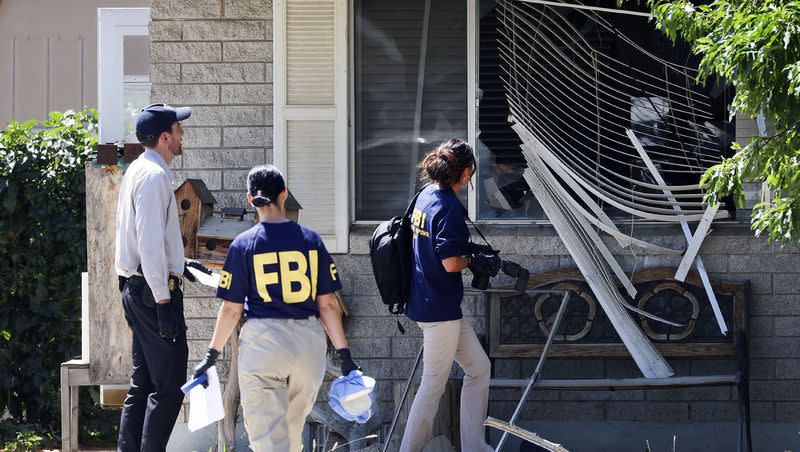Opinion: Threats against the president are not protected speech, but questions remain in Provo killing

Many Americans were no doubt surprised Wednesday by reports that the FBI had shot and killed a Provo man who had posted threats against President Joe Biden and other Democratic elected and appointed officials on social media.
The shooting appears to be the latest manifestation of just how deep and potentially dangerous the nation’s political divide has become to some Americans. Graphic and specific threats of violence are indeed disgusting and concerning. Such threats are not protected free speech, and federal agents cannot afford to take physical threats to the president or other officials lightly.
However, the incident was a tragedy that left many questions unanswered, including why an alternative method of approach and arrest, rather than the early morning SWAT action, was not attempted for the 75-year-old suspect who, neighbors said, had limited mobility. Could he not be investigated and monitored further or arrested and detained when he was headed out away from his home arsenal?
We urge the FBI to be more forthcoming with facts concerning the event. It is clear there were many weapons in the man’s home. Less clear is the circumstances that occurred after the FBI crashed through a window and confronted the Provo man. Was he in fact armed? Did he threaten with a weapon? Did he fire a weapon?
Related
An eyewitness details what happened when the FBI came to a Provo neighborhood
Did the FBI do the right thing? Analyzing the raid that killed a man who threatened President Biden
Regardless, a larger lesson here is that words are powerful and can impact the world for good or ill, and the words Craig Robertson had chosen to vent his political feelings online were especially vile. A 37-page complaint spells out many of these threatening posts, including one concerning the president’s visit to Utah this week. “I hear Biden is coming to Utah. Digging out my old ghille suit and cleaning the dust off the m24 sniper rifle. Welcome, buffoon-in-chief!”
A few months ago, he posted, “The time is right for a presidential assassination or two. First Joe, then Kamala!!!” Another time, he posted a photo of a firearm, calling it a “DEMOCRAT ERADICATOR.”
Title 18 of the United States code makes it a felony to knowingly and willfully mail or otherwise make “any threat to take the life of, to kidnap, or to inflict great bodily harm upon the president of the United States.” Given Robertson’s consistent and, at times, graphically specific threats, federal agents approached him outside his home last March. An FBI special agent said Robertson told them, “We’re done here! Don’t return without a warrant!”
He subsequently posted threats as to how he was prepared to shoot the agents.
The Constitution provides Americans with the freedom to speak their minds. This is a sacred freedom. However, courts have long recognized that free-speech rights do not extend to so-called “fighting words,” or words that are intended to injure or incite people to violence. A 1942 Supreme Court decision in Chaplinsky vs. New Hampshire said, “It has been well observed that such utterances are no essential part of any exposition of ideas, and are of such slight social value as a step to truth that any benefit that may be derived from them is clearly outweighed by the social interest in order and morality.”
The political rhetoric of recent years has reinforced the wisdom of that statement. Threats and name-calling do not, in any regard, constitute steps to truth.
Given the extreme nature of Robertson’s published threats, and the reasonable belief he was armed, it’s understandable why a judge would approve a warrant for his arrest, especially on the day the president was to visit the state. It’s also reasonable that agents may have feared for their own safety while making that arrest.
Neighbors described hearing FBI agents calling for Robertson to come out of his house. One neighbor told the Deseret News he heard Robertson answer defiantly before the shooting started. Robertson could have avoided trouble by surrendering peacefully.
Still, the shooting leaves us wondering how things might have been handled differently.
The FBI said the shooting would be reviewed by its Inspection Division. That sounds too in-house. The public would be best-served by an independent review that looks at why force was needed, why Robertson’s body was allowed to lie on a sidewalk in plain sight for two hours, why Robertson was considered a legitimate threat to the president’s visit, considering his physical limitations, and what alternative, less aggressive approaches to delivering an arrest warrant might have been considered instead.
Words are powerful. And threats have consequences, whether it’s against any individual, and certainly if it’s against the president.

